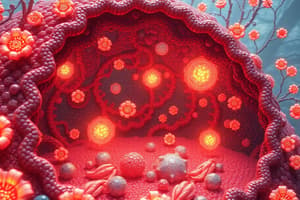Podcast
Questions and Answers
What is the primary characteristic of passive transport?
What is the primary characteristic of passive transport?
- Substances move down a concentration gradient. (correct)
- Involves bulk transport mechanisms.
- Substances move against a concentration gradient.
- Requires energy input to facilitate movement.
Which process specifically involves water movement through a selectively permeable membrane?
Which process specifically involves water movement through a selectively permeable membrane?
- Active transport
- Osmosis (correct)
- Bulk transport
- Facilitated diffusion
What type of transport requires energy in the form of ATP?
What type of transport requires energy in the form of ATP?
- Diffusion
- Osmosis
- Active transport (correct)
- Facilitated diffusion
In what form does active transport typically use energy?
In what form does active transport typically use energy?
Which of the following is NOT a characteristic of facilitated diffusion?
Which of the following is NOT a characteristic of facilitated diffusion?
Flashcards are hidden until you start studying
Study Notes
Transport Across the Plasma Membrane
- Cells require a system to allow materials to enter and exit.
- Two main types: Passive Transport and Active Transport
Passive Transport
- No energy required
- Substances move down a concentration gradient, from an area of high concentration to an area of low concentration.
- Examples of Passive Transport:
- Diffusion: The movement of molecules from an area of high concentration to an area of low concentration.
- Facilitated Diffusion: The movement of molecules across a membrane with the help of transport proteins.
- Osmosis: The movement of water across a semi-permeable membrane from an area of high water concentration to an area of low water concentration.
Active Transport
- Requires energy input
- Energy is in the form of ATP
- Moves ions against their concentration gradient
- Types of Active Transport
- Primary Active Transport: Directly uses ATP to move substances across the membrane.
- Secondary Active Transport: Uses the energy stored in the concentration gradient of one substance to move another substance across the membrane.
- Bulk Transport: The movement of large molecules across the membrane by endocytosis or exocytosis.
- Antiport: Two substances move across the membrane in opposite directions
- Symport: Two substances move across the membrane in the same direction.
Studying That Suits You
Use AI to generate personalized quizzes and flashcards to suit your learning preferences.




